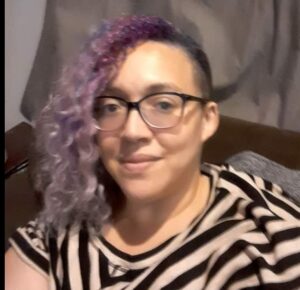Bringing our messiness to God’s transformation mountain

The gospel reading for the Second Sunday of Lent is a powerful one. We see Jesus and his three disciples go up to the mountain. They go to the mountain top, and they are transformed. Jesus is transformed through his Transfiguration. His face shines bright like the sun. And how could the disciples experience Christ’s Godhood in such a physical way and not be transformed themselves. There are three disciples on the mountain top; and Elijah, Moses and Jesus stand before them: the three greatest prophets. The trinity is reflected on this mountain top.
The phrase in the Gospel that sticks out the most to me is “This is my Son with whom I am well pleased.” God says this from a cloud and the disciples prostrate themselves in fear. How many times do we, God’s holy children, give into fear? I know I have time and time again. Fear is not trusting in God. Jesus touches the disciples and tells them to not be afraid. This is the moment that we truly see them let go of their fear, so that they can be transformed. I know I have been transformed myself. I was baptized Catholic but then I was not raised in the Catholic church. I felt a hole, like something was missing. I have been a full member of the church since 2009. But I know I still can be transformed; I just have to let God lead me.
Today we sang “Lead Me, Guide Me,” an African American hymn, a spiritual that I know very well. We need to let God lead us to the mountain so we may be transformed. We must trust him and follow his will and not our own. The reason we chose that hymn to gather us is to show our universality in the Catholic Church. We, just like the disciples and just like the three Marys who walked by faith, all come from different walks of life, speak different languages and come from different cultures. And we may have different gender identities, orientations, races. But we know from this Gospel especially, that if we bring everything to the altar to God, in other words, if we bring our mess to the mountain, we too can be transformed. We must give our fears to our Creator. Because although many things may seem impossible; nothing is impossible for God. He is well pleased with Jesus; he sees him, and he sees and loves each and every one of us and meets us where we are at. But this is not something God does for us alone. We must show up for Jesus like my grandma always used to say. If we take our faith, be it as small as a mustard seed, we can bring it to that mountain and be transformed. And not only the people of the church can be transformed, the church itself can be transformed – needs to and wants to be transformed as we have seen in this synodal process.
St. Phoebe is the core of the reason why we are all gathered here today. As we will see during our time to reflect on Becky’s beautiful image “From Fragmentation to Wholeness,” there can be no transformation unless we all come together and incorporate our individuality and our beauty as God’s holy children and weave it together to push our church into the future and really embrace the fact that we need to be a universal church.
Uplifting women and restoring the diaconate for women and recognizing their role in the church is our way to transform. Like the three disciples and like Jesus we must strive to be transformed. We cannot rest on our laurels. We must always be willing to further our faith and walk in the light, and that light includes St Phoebe, this group, our universal church and the most Holy Blessed Trinity.
Reflection questions:
As you reflect on the image “From Fragmentation to Wholeness”
- What are you/we being called to transform?
- How has your identity as a disciple, especially as a woman, transformed over time?
- How is God making Godself present to you in that work of transformation?
“From Fragmentation to Wholeness” by Becky McIntyre, a community artist and alumna of St. Joseph University Class of 2017 and a member of the Philadelphia Discerning Deacons Circle

Dorina Pena
Dorina is a parishioner of St. Vincent De Paul Parish in Philadelphia where she is a leading member of the Young Adult Ministry group and Director of Environment. She is part of the Philadelphia Discerning Deacons Circle and had near perfect attendance in Discerning Deacons' School for Synodality.



